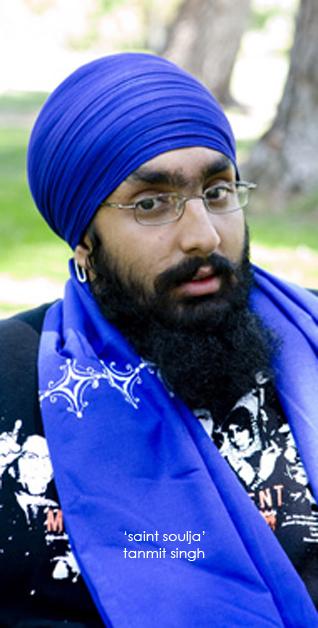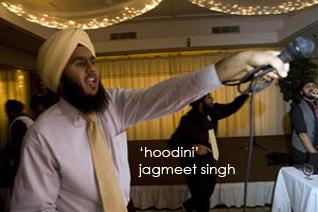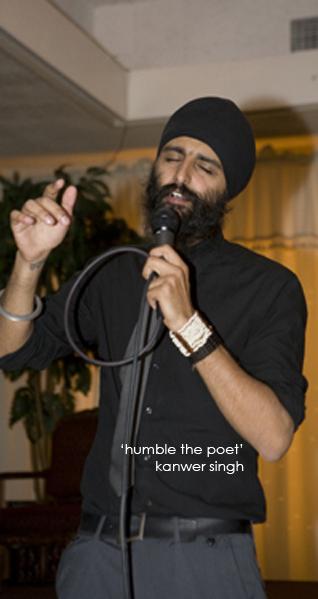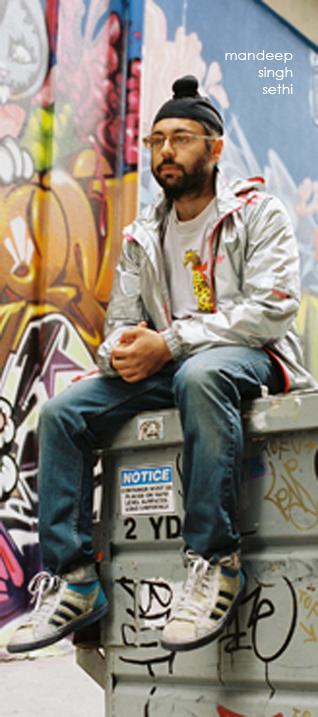Music
The Bronze Underground
by NAVDEEP SINGH DHILLON
Socially conscious hip hop from the days of Public Enemy and N.W.A. seems to have all but vanished, replaced with the glamour of being a "G" - complete with tales of sexual conquests, gold plated grills, non-stop parties, drugs, alcohol and of course more "bling bling."
But there's a revival bubbling up across North America - and it has its roots firmly grounded in Sikh America. From L.A. to Toronto to D.C., young men of the Sikh faith have taken up the mantel of hip hop, writing powerful tracks about oppression, racism and politics.
Their music is informed by Sikh philosophies such as miri-piri, a religious tenet that advocates political and social activism to benefit society alongside individual spirituality.
"I think it's impossible to be a Sikh and not be an activist," says D.C.-based rapper Tanmit Singh, known as Saint Soulja. "Our entire faith is based around the concept of being activists."
Still, some of these artists shy away from using the term "activist" to describe what they do.
"I look at my music as a personal project," says Toronto-based Kanwer Singh, who goes by Humble the Poet. "I talk about things that I find interesting, and it happens that most of the things I find interesting are socially related, but I don't consider myself an activist."
They don't call themselves Sikh rappers, either.
Despite their commitment to their faith and the issues they face within their community - the majority of these artists take exception to being boxed in with the label for the same reason Eminem doesn't call himself a white rapper and Steven Spielberg doesn't identify himself as a Jewish director. Artists who happen to be Sikh or "ethnic" shouldn't need to convey more meaning and history than "non-ethnic" artists.
"I think it's a bullshit term," says Kanwar Anit Singh Saini of Montreal who's known as Sikh Knowledge. "I'm a human being - that's my baseline. Then I'm Sikh and a rapper and whatever."
But the outward appearance of these artists - most clearly marked by the Sikh symbols of a turban and beard - doesn't make being taken seriously as an artist particularly easy. "[It] definitely makes it difficult to fit in as a hip-hop artist," says Mandeep Singh Sethi, a San Francisco rapper. "But really, it only affects me as much as I let it."
Jagmeet "Hoodini" Singh, an L.A-based emcee, agrees that sometimes it's difficult to bridge the two worlds of Sikh culture and hip hop.
"Obviously, if you wear a turban, people are going to question that you rap. They might think it's a joke," he says. "And as soon as you say, ‘Yo man I rap,' they are going to tell you to prove it. So you better be able to prove it on the spot with some doooope rhymes that you got what it takes to call yourself an emcee. If your rhymes are real and genuine, then people will feel you within the first few bars. That's been my experience."
Still, being bronze and being good, as these artists are proving themselves to be, can also work to their advantage. Despite the moniker, Humble the Poet doesn't mind having all eyes on him. "The outward veneer of my appearance helps me stand out in the crowd," says Humble. "I was in Amsterdam recently trying to convince some hip-hop heads I could rap. It was clear they didn't buy it until I started spitting."
Tanmit Singh doesn't think it is restricted to the world of hip-hop. "I think any industry or profession where you are in the public's eye, Sikhs will face difficulties," says Tanmit Singh, aka Saint Soulja. "But as long as you're good, nobody cares about what you look like or what you wear. Hip hop is a very open minded and accepting community. So when you can prove to the people that you belong, they'll welcome you with open arms."
TANMIT SINGH
MC Name: Saint Soulja
Reprezentin': Washington, D.C., U.S.A.
A Little Taste: "One: stop and pause/ Say two: figure out your cause/ Say three: let's get free/ The revolution starts with me/ Revolution makes lions outta cowards/ I'm a rebel to this world/ And I fight with a cause and if I lose my swords/ Imma fight with my paws." - "Soulja's Story" from the album, Soulja's Rise
His Story: In addition to being a hip-hop artist, the multi-tasking Tanmit Singh, 21, just graduated from Drexel University with a bachelor's degree in accounting and entrepreneurship. "The accounting degree is a fall back so I have something to make a living with," says Tanmit. "The entrepreneurship degree I am using for both my music career and my clothing line." This practicality is to ensure his school teacher single mother that that her son won't be rapping in the streets. "I understand where she's coming from," he says. Still, he dreams of pursuing his music full time and doesn't think creative types having something practical to fall back on is a particularly Sikh thing. "A lot of musicians out there, rappers included, have day jobs and do music on the side till they get their big break."
Family Business: Along with his brother, Sunmit Singh, Tanmit runs Rootsgear, a clothing line dedicated to making bold political statements while being fashionable. He also represents G.N.E., a group of artists (including brother Sunmit) "who make socially-politically conscious music and try to move the masses on a day-to-day basis through hip hop." People often ask Tanmit what G.N.E. stands for. His answer is always cryptic. "I would love to tell you," he says before dramatically pausing. "But I can't because then I'd have to kill you." The reason for the secrecy is that he wants you to tell him. "We keep the standings of the acronym a secret because we want the people who listen to our music to figure out what it stands for by themselves."
Strong Conviction: Because of Tanmit's strong religious upbringing, he has never felt any difficulty balancing the east and west parts of his personality. "We rock mics, but we also rock kirpaans," he says of the symbolic dagger worn by baptized Sikhs. "We record songs and go to concerts, but we also make it to the gurdwara (Sikh church) on Sundays. It's the perfect balance."
Listen Up: The debut mixtape from G.N.E. titled "Soulja's Rise" is now available for free download at www.datpiff.com. To download or view his other music, check out www.myspace.com/gnetalks and www.youtube.com/tanmit. G.N.E.'s music video/short film titled "turBAN" premiered in New York, Toronto and online in September.
KANWAR ANIT SINGH SAINI
MC Name: Sikh Knowledge
Reprezentin': Montreal, Canada
A Little Taste: "The dance of the marginalized till my feet bleed like Rekha/ Play Ribs like xylophones balancin music and hunger/ I dance for 84, I dance for Darfur/ while they dance to duck ammunition during war." - From "Technorganic"
His Story: Raised by a single father in Montreal from the age of 16, Kanwar, 28, was on track to study engineering when the then-eighth grader was waylaid by a Smith & Wesson instrumental on Rap City. "It hit me like a ton of bricks," he recalls. "It was ‘Soundboy Burial,' and I heard that instrumental and my life changed. That was it. I was convinced this is what I wanted to do for the rest of my life. Make beats. Make music. It's just that passion in me."
Smart Boy: Still, the pressure to please his dad weighed on him. So after getting his Bachelor of Arts degree in music with a minor in linguistics from Concordia University, Kanwar completed his Masters of Science in speech language pathology at McGill University. "As a bronze man in North America, I would love to make the statement," says Kanwar, "that you can be an emcee or musician and still be an educated man, you know? I wasn't blessed with the wallet, but I still have hip hop."
Standing Up: Kanwar says his music is a call to action against oppression, which he himself faced growing up in Montreal. "There were tons of racial issues. We had to fight for certain things - from wearing a kara (a steel bracelet) during basketball to wearing a patka (a small piece of cloth Sikh boys wear to cover their hair) during basketball," says the turbaned rapper. "There were the obvious looks and stares after the Air India bombing in 1985 and after Sept. 11. And two years ago, I was asked by a judge to ‘take my hat off' when I was protesting a parking ticket. Of course I didn't and I complained." Then he channelled his frustrations into his music.
Standing Out: "I'm the ultimate minority. Even in the gay clubs in Montreal, I stand out because I'm Sikh and I spin hip hop while they're all about techno," laughs Kanwar, who came out in 2001. "Despite the homophobia that pervades hip hop, being gay afforded me the emotions to rhyme about shit I needed to get out. Being Sikh, as a visible minority, I always feel the need to level the table with everyone. It's a very self conscious game, like, can I explain myself with art?"
Listen Up: Check out the latest, including his new track "Lovher" with Humble the Poet, on myspace.com/sikhknowledge or check out his blog at www.bomr.ca 
JAGMEET SINGH
MC Name: Hoodini
Reprezentin': Los Angeles, U.S.A.
A Little Taste: "The government's been trying to burn Punjab/ Living in this hell, so we forgot that we should turn to God/ Forgot that we were kings, so they all took their turbans off/ But the revolution's back and there's no way that you can turn it off!" - "My People" from The Magic Show.
His Story: Growing up in L.A., the 19-year-old UCLA sophomore got grounded in hip hop at a very young age. "All the way back in third grade, I was listening to Will Smith rhymes and writing some myself," he says, laughing. "The first song I wrote in third grade was this track called ‘Smackaroo to Timbuktu' about this kid who got in so much trouble, his mom hit him so bad he ended up in Timbuktu, Africa."
Rising Up: The "feel good" rhymes of Will Smith were just the beginning. Soon he was listening to heavyweights like N.W.A., Public Enemy and Wu Tang Clan. "Songs like ‘F*ck the Police' by N.W.A. may not be the most child friendly, but they present a reality that isn't covered in the media," says Jagmeet. "It's a reality that needs to be heard. And it's helped us, as people of color in America, not just Sikhs but blacks, Latinos, Asians, Indians, Punjabis, whatever it may be. Hip hop provides people of color an outlet as the underdogs in America."
On the Downlow: Jagmeet kept his music under wraps until it was outed by an interfering auntie. "This auntie went up to my dad like, ‘I heard your son's music. It was really good.' And my dad was like, ‘My son sings?'" he says. "So finally I showed him the CD and he was like, ‘You're pretty good. You just need somebody to hear you and I think you'll go far.' That's how my parents found out! They were very supportive, but I didn't plan on telling them. I was afraid to, actually, but God has his own plan. You know how it is."
The Practical Activist: Jagmeet is very passionate about his music, but he doesn't view hip hop as the only road to activism. "My parents are very supportive of my music. But at the same time, my dad understands that his own success is largely due to his education. And I understand that as well," says the global studies major. "So I stay in school. Eventually I want to go to law school so I can work as a civil rights attorney. I just want to give back to humanity, in one way or another. Activists take many forms, hip-hop artists and (uncorrupted) civil rights attorneys included."
Listen Up: Find Hoodini's latest, "The Magic Show," at rukusavenue.com, or check out his older stuff at myspace.com/HoodiniSingh
KANWER SINGH
MC Name: Humble the Poet
Reprezentin': Toronto, Canada
A Little Taste: "Can we ever really truly understand war?/ Until we can put a finger through the bullet hole/ Smell the gunpowder/ And be devoured by the history and misery it gives to me/ Thinking about ‘84" - From "Singh With Me."
His Story: Growing up in ethnically-diverse Northwest Toronto, elementary school teacher Kanwer Singh, 28, developed his love of hip hop early on. "I would walk to school every day with my CD player, just listening to any artist who had anything worth saying," he recalls. Artists such as Outkast, Lauryn Hill, Nas and Saul Williams helped shape his contribution to hip hop, which he describes as "‘believe me music.' The only criteria is that it is honest and it will always do justice to the art form."
Kanwer admits that he has never actually talked to his dad, a cab driver in Toronto, about his affinity toward the spoken word, but knows that both of his parents, his two sisters and even his extended family, fully support him. "My dad sees it as poetry and tries not to lump me in with the Puff Daddies and 50 Cents. But I know he hasn't heard any of my work. He's not a fan of swearing."
Paying the Bills: Had it not been for his sister suggesting he teach, Kanwer very well may have followed up his practical undergraduate degree in information technology with an even more practical MBA. With his volunteer experience at Sikh Youth Camps and good rapport with children, teaching seemed like it would be a good fit. "Teaching is pretty much effective delivery of content and igniting a fire of learning," says Kanwer, who employs these same skills in his other "job" as an emcee. "My goal is to break down and articulate complex ideas and emotions to the listener. This task is no different then trying to explain to an 8-year-old how plants get food from the sun."
Fight The Power: With politically laced tracks like "F*ck Obama," Kanwer is not afraid of controversy. "Criticism on my content comes with the territory," he explains. "I'm sure Barack Obama is cool, but he's a political figure and he plays political games. And it was important to call out his B.S. early, not to defame his character, but to show folks that the powers that be will put a coloured man on stage to help avoid a revolution. I think people should not aspire to become successful within the confines of this inequitable racist system, but instead use their energy to overcome that system."
Listen Up: Humble the Poet is collaborating with Sikh Knowledge on their first official single, "LovHer," which is set to release in October. Check out his blog, listen and download music or find out where to catch him live at www.thepoetproject.com
MANDEEP SINGH SETHI
Reprezentin': San Francisco, U.S.A.
A Little Taste: "Rhyme like your life depends on it/ Be honest when you're rockin'/ But be cautious of your friends changing promise./ It's coming around. It's probably comin' now./ So be ready. F*ing ready. With machetes and rounds." - From "Boat of Hope"
His Story: Despite his youth, 20-year-old San Francisco State University broadcasting and electronic communication major Mandeep is no newcomer to the world of hip hop. "I started rocking rhymes when I was 12, recorded my first demo when I was 15, put out my first mixtape when I was 16, " says Mandeep. Just three years later, he has gone on tour to Spain, the U.K. and India, with a world tour in the works. He has even opened for "cats like Ziggy Marley, Michael Franti, Zion I and Rza of Wu Tang Clan," among others.
"I see hip hop as liberation music, and as oppressed people in a white privileged patriarchal system, it's what speaks to the needs of me and my community," says Mandeep. Even though he has no qualms speaking his mind about the racism and prejudice that he has encountered because of his appearance, his music does not revolve around being Sikh or South Asian. "I rap about issues that are occurring around the world like genocide, famine, the negative aspects of capitalism as well as things affecting my local community."
Passing the Torch: In tandem with his music, Mandeep also works as a youth organizer and poet mentor at Definitive Education where he uses hip hop as a medium to teach elementary, middle and high school students "to empower themselves through words and music."
Listen Up: Mandeep, who debuted a video at The Spinning Wheel Film Festival in Toronto, Canada, this summer about the 1984 Sikh genocide, will be releasing an album with Humble the Poet and Povan Beats entitled "Set and Ra," and working on a documentary about the growth of hip hop in India. Find him at myspace.com/mandeepsethi or organikrebirth.com.
 
[Courtesy: EastWest]
November 27, 2009
Conversation about this article
1: Suzy Kaur (Oxford, England), November 27, 2009, 10:00 AM.
I hope and wish that they are also rapping about forced marriage, caste-based racism and honor crimes.
2: Parmjit Singh (Canada), November 28, 2009, 5:40 AM.
Thank you, sikhchic.com, for a much overdue article on these artistic gems. These young men and women are philosopher-poet revolutionaries. I have followed some of their relatively hidden work around the net and relate to the Sikh spirit that shines in their words. For more than one of them, I have thought to myself, with a little backing, this talent will touch hearts worldwide. Sikhs across continents often have to strategize how to counter the negative media. In these artists we have packaged with love, social messages that will do a better job of truth than any campaign we can come up with. Their messages are inspirational to all and they are leaders of social change as Sikhs must be. Sikh brothers and sisters, please support these artists. Support their music, their businesses, and their success so they can continue to restore a passionate humanity in global culture. Suzy Kaur, you don't have to hope and wish, have a look at GNE's work: haunting, inspiring, makes you cry, yet makes you tough. I am at a loss for words to describe their words. GNE/Saint Soulja is a delivery of a pot of gold at the doorstep of the Sikh community and humanity, let's treasure them as such.
3: Gagan (Bloomington, Indiana, U.S.A.), November 29, 2009, 2:26 AM.
Great post!
4: Harpreet (Austin, Texas, U.S.A.), November 30, 2009, 7:58 PM.
What about our youth marrying outside their faith ... I see so many of them ... just Youtube and you'll see! I just abhor Sikhs marrying hindus!
5: Kanwar Nijjer (Victoria, British Columbia, Canada), December 24, 2009, 12:00 PM.
Harpreet ji: According to Guru Sahib, the entire human race is one. Marrying a non-Sikh should not be an issue, as long as you uphold Sikh values. Sikhism is an all-encompassing philosophy and way of life; one should be able to mould each situation in accordance with it spiritually.
6: Dhillon (India), December 26, 2011, 7:51 AM.
Awesome post! Keep it up! :D






